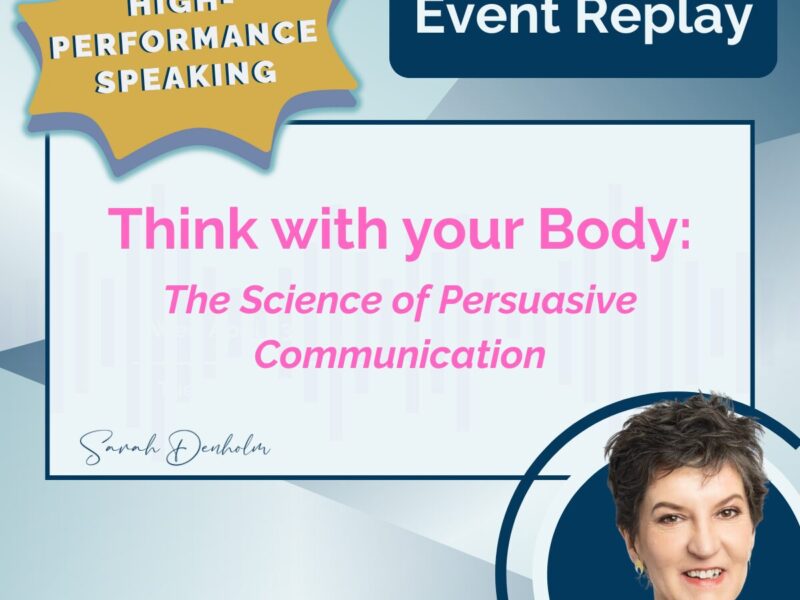How to Overcome Public Speaking Fear
Let’s talk about fear today. Fear in general – and public speaking fear in particular. What can be done about it? Is it even possible to learn how to overcome public speaking fear?
I’ve been speaking with one of my private coaching clients this week, who’s trying to decide whether or not to join my course; and we ended up having a chat about what she calls her “avoidant tendencies”. One part of her wants to do the course and face her fear in front of a group, but the other part of her is fighting the whole idea – her mind is telling her that this is a really bad idea!

This of course makes perfect sense. My client’s been struggling with a really bad experience she had as a student: she froze in front of an audience that included not only her student peers but also lecturers in her subject. She was so humiliated that she fled the room and went and sat in the toilet for two hours until everyone had gone – and ever since then the memory has stopped her in her tracks.
Fear learning
Michael Davis, an Emory psychologist, tells us that ‘fear learning’ is probably the strongest memory system we have. We can learn a fear memory instantly and it will last for the rest of our life – if we don’t do something about it. Unfortunately, our brain’s amygdala which triggers the fear response is there to help us literally survive in the world; it acts like a sledgehammer when it thinks we’re under threat…when in most situations we don’t need that level of response. Avoiding fear is our most common means of coping with the threat.
But this also means that if we don’t expose ourselves to our fears, we don’t get to learn that actually we can cope with them.
Frightening, bad public speaking experiences are horribly common – including for myself in the past. So if that’s the case for you, what can you do about it – other than try to avoid the situation? And often, avoidance isn’t even possible – if work doesn’t get you, then a social scenario like a wedding will!
How many times have you told yourself that you need to do something about your fear of public speaking? And you do nothing.
Or maybe it’s been suggested that you get help to work on your fear by an employer, a business associate, or even your life partner. I even had a client recently come to me because a public speaking trainer (brought in for a workplace professional development day) told him “you really need to do something about your fear – it’s affecting your credibility”…without giving him any ideas on how to fix it. Oh, he did make one suggestion: he told the fearful man to “just relax!”. Do you find that advice helpful when you’re completely stressing out? Me neither!
So you tell yourself you need to improve, or you hear it from other people – and you agree that it’s a very good idea. Then you do nothing. (Sometimes for years.)
It all just seems too hard – so you avoid it. And of course you’re not alone. After all it’s not like you don’t know that it’s a good plan. But it may feel so horrible to even think about that you push the feelings and the thoughts away; or you focus on the very good reasons why it’s not a good idea right now. There are always reasons why it’s not a good idea. And it doesn’t feel great to push it away – but you think it’s better than actually going through the process of learning to overcome your fear. Because of course none of us get excited at the prospect of going through anything unpleasant or stressed provoking, to put it mildly! You’re thinking “this is not going to be fun…and I already have enough going on at the moment. Let’s leave it for now”.
So what’s the answer?
The good news is that public speaking fear is shiftable.
Neuroscientist Michael Fanselow, a UCLA fear researcher tells us that when someone is afraid, the answer isn’t to try and figure it out rationally, suppress the fear, or avoid it entirely. The answer is exposure. This may seem like bad news! But it’s actually helpful. Moving through fear is the way out of it – in a safe, supportive atmosphere. Fanselow also says that there is no evidence that you can get over the fear without exposure. Exposure over time and in small doses allows you to move through it.
What your brain is learning around the fear
When you feel afraid in a safe supportive space, that’s actually useful – believe it or not! You’re exposing yourself to that unpleasant emotion – and the more you let it play out, the more you allow your brain to process it. You learn that you can cope. Your amygdala, which triggers the fear response, needs to learn that’s when it’s faced with the threat of public speaking it doesn’t have to fire off a major fear reaction. Your higher evolutionary brain, the prefrontal cortex, learns that you’re actually ok in the situation. You’re not going to die. You can move through it.
And as you learn not to run away, you start to gain a new flexibility. There may always be some degree of apprehension about putting yourself in a vulnerable position in front of a group – that’s totally normal… And any public speaking coach who tells you that you can lose your fear entirely, is either overselling their case, or is someone who really enjoys being in front of a group, and has never experienced the visceral, gut-wrenching feelings of real public speaking fear. I have experienced that fear. I know exactly what it’s like. It’s horrible. But it’s not a life sentence, unless you allow it to be. It’s moveable.
I encourage you to start thinking about what might happen positively if you do take the first steps to overcome public speaking fear. What benefits will it give you? Give yourself permission to do something about your fear. Find a supportive course (the link to mine in Melbourne is here!) or public speaking coach (my coaching page); speak to someone encouraging. Take a small first step.
Even information gathering and online reading and learning is a great thing, and very helpful. If you can’t get to a live course, the many resources out there can still help you…and will give you the foundation for real – and faster – improvement, if and when you can join a group.
Best wishes with your public speaking!




